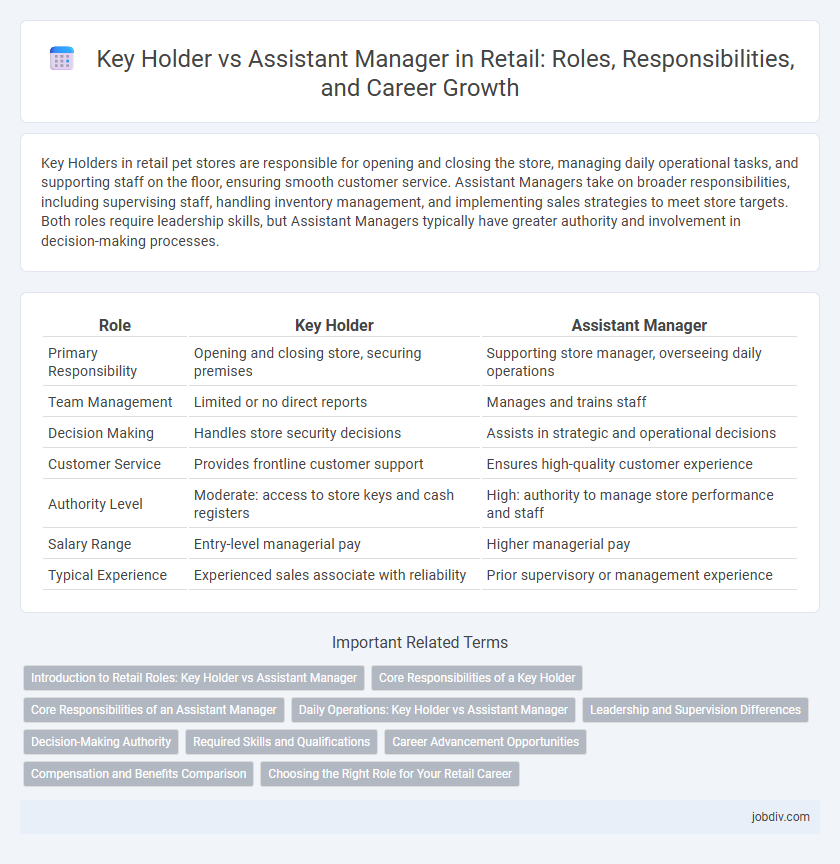Key Holders in retail pet stores are responsible for opening and closing the store, managing daily operational tasks, and supporting staff on the floor, ensuring smooth customer service. Assistant Managers take on broader responsibilities, including supervising staff, handling inventory management, and implementing sales strategies to meet store targets. Both roles require leadership skills, but Assistant Managers typically have greater authority and involvement in decision-making processes.
Table of Comparison
| Role | Key Holder | Assistant Manager |
|---|---|---|
| Primary Responsibility | Opening and closing store, securing premises | Supporting store manager, overseeing daily operations |
| Team Management | Limited or no direct reports | Manages and trains staff |
| Decision Making | Handles store security decisions | Assists in strategic and operational decisions |
| Customer Service | Provides frontline customer support | Ensures high-quality customer experience |
| Authority Level | Moderate: access to store keys and cash registers | High: authority to manage store performance and staff |
| Salary Range | Entry-level managerial pay | Higher managerial pay |
| Typical Experience | Experienced sales associate with reliability | Prior supervisory or management experience |
Introduction to Retail Roles: Key Holder vs Assistant Manager
Key Holder and Assistant Manager roles in retail both involve store leadership but differ significantly in responsibilities and authority. Key Holders manage opening and closing duties, secure the premises, and support customer service, while Assistant Managers handle broader operational tasks including staff management, inventory control, and sales targets. Understanding the distinction helps retailers optimize team structure and enhance store performance.
Core Responsibilities of a Key Holder
A Key Holder in retail is primarily responsible for opening and closing the store, securing merchandise, and handling cash management with accuracy. They ensure the store's safety protocols are followed and support sales staff by maintaining product displays and assisting customers. Unlike an Assistant Manager, Key Holders focus more on operational tasks and frontline support rather than managing staff or overseeing overall store performance.
Core Responsibilities of an Assistant Manager
An Assistant Manager in retail oversees daily store operations, including managing staff schedules, ensuring customer satisfaction, and maintaining inventory accuracy. They implement company policies, support the Store Manager in achieving sales targets, and handle employee training and performance reviews. Key Holders primarily secure the store and handle opening or closing duties, while Assistant Managers take on broader leadership and operational responsibilities.
Daily Operations: Key Holder vs Assistant Manager
Key Holders in retail oversee daily operations by opening and closing the store, managing cash registers, and ensuring security protocols are followed. Assistant Managers handle broader operational duties, including staff scheduling, inventory management, and addressing customer service issues to maintain store performance. Both roles are critical for smooth daily operations, with Assistant Managers having greater responsibility for strategic decision-making and team leadership.
Leadership and Supervision Differences
Key Holders primarily focus on opening and closing stores, managing daily operational tasks, and providing direct supervision to sales associates during shifts. Assistant Managers hold broader leadership responsibilities, including staff training, performance evaluations, and strategic decision-making aligned with store goals. The Assistant Manager's role demands advanced supervisory skills and accountability for overall store performance, whereas Key Holders support leadership through more task-specific oversight.
Decision-Making Authority
Key Holders typically have limited decision-making authority focused on daily operational tasks and store security, while Assistant Managers possess broader decision-making power including handling employee issues, managing inventory decisions, and executing store policies. Assistant Managers are authorized to make strategic decisions affecting sales targets, staffing, and customer service standards, whereas Key Holders mainly support these functions under supervision. The level of autonomy granted to Assistant Managers reflects their role in driving store performance and leadership compared to the more task-specific responsibilities of Key Holders.
Required Skills and Qualifications
Key Holders require strong organizational skills, attention to detail, and reliability to manage store opening and closing tasks effectively, often needing basic retail experience and trustworthiness. Assistant Managers must demonstrate leadership abilities, proficiency in inventory management, and excellent customer service skills, typically requiring previous supervisory experience and formal retail management training. Both roles demand strong communication, problem-solving skills, and the flexibility to handle varying retail environments efficiently.
Career Advancement Opportunities
Key holders gain practical leadership experience by managing store operations and security, positioning themselves as strong candidates for assistant manager roles. Assistant managers benefit from a broader scope of responsibilities, including team supervision and sales strategy implementation, which significantly enhance their career advancement potential towards store manager positions. Progressing from key holder to assistant manager typically involves demonstrating reliability, leadership skills, and a deep understanding of retail operations to access higher-level management opportunities.
Compensation and Benefits Comparison
Key Holders typically receive hourly wages with overtime pay eligibility, while Assistant Managers often earn a higher salary with performance bonuses and profit-sharing options. Benefits for Assistant Managers usually include enhanced healthcare plans, retirement contributions, and paid time off compared to Key Holders who may receive more basic benefits. The compensation package for Assistant Managers reflects greater responsibility and leadership expectations within retail management.
Choosing the Right Role for Your Retail Career
Choosing between a Key Holder and an Assistant Manager role in retail depends on your career goals and desired responsibilities. Key Holders primarily focus on store operations, security, and opening or closing shifts, while Assistant Managers take on broader leadership duties such as staff management, sales targets, and day-to-day decision-making. Evaluating your leadership aspirations and willingness to handle operational challenges will help determine the best fit for advancing your retail career.
Key Holder vs Assistant Manager Infographic

 jobdiv.com
jobdiv.com